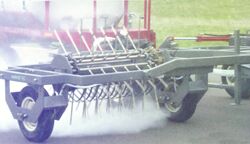
Baling alfalfa below 12 percent moisture can cause leaves to shatter and fall off stems. A new "artificial dew" machine solves the problem by injecting water -- with a softening agent added -- into windrowed alfalfa.
The Dew Simulator is designed to be used about 10 minutes before baling. The machine has a reel equipped with 18-in. long tines on 5-in. spacings. A pto-driven piston pump delivers water and the softening agent from a customer-supplied trailer tank to the tines. The tines poke down into the windrow and spray in a fine mist from the bottom of the windrow up. The tines are on a cam so they enter the windrowed hay vertically without disturbing it. Liquid is released only when the tines are within the hay.
"It leaves the windrow as soft as if it had just received the ideal amount of natural dew," says Jeff Roberts, Harvest Tec, Hudson, Wis. "We've field tested the unit on about 2,000 acres during the past four years. In the past, many farmers have tried to spray over the windrow to bring the moisture content up. However, they can only reach the top of the windrow.
"Application rates vary between 1/2 ton and 3 tons per acre, depending on how much hay is raked together to form a windrow. At a treatment rate of one ton per minute. the Dew Simulator causes up to a 6-point increase in moisture. The application rate can be adjusted by a valve trip that adjusts for windrow depth and yield variations. Application requires 10 to 18 gal. of water to one pint of softening agent per acre, so most producers will want to pull about a 1,000-gal. tank behind the machine."
Because of dry weather conditions, many hay growers in western states have to bale at night. Roberts says the goal of the Dew Simulator isn't to replace nighttime baling, but to expand the number of hours of baling. "You can use the machine to start baling earlier in the evening and run it until natural dew comes in, and also to bale later in the morning as the alfalfa dries and before the sun gets too direct."
